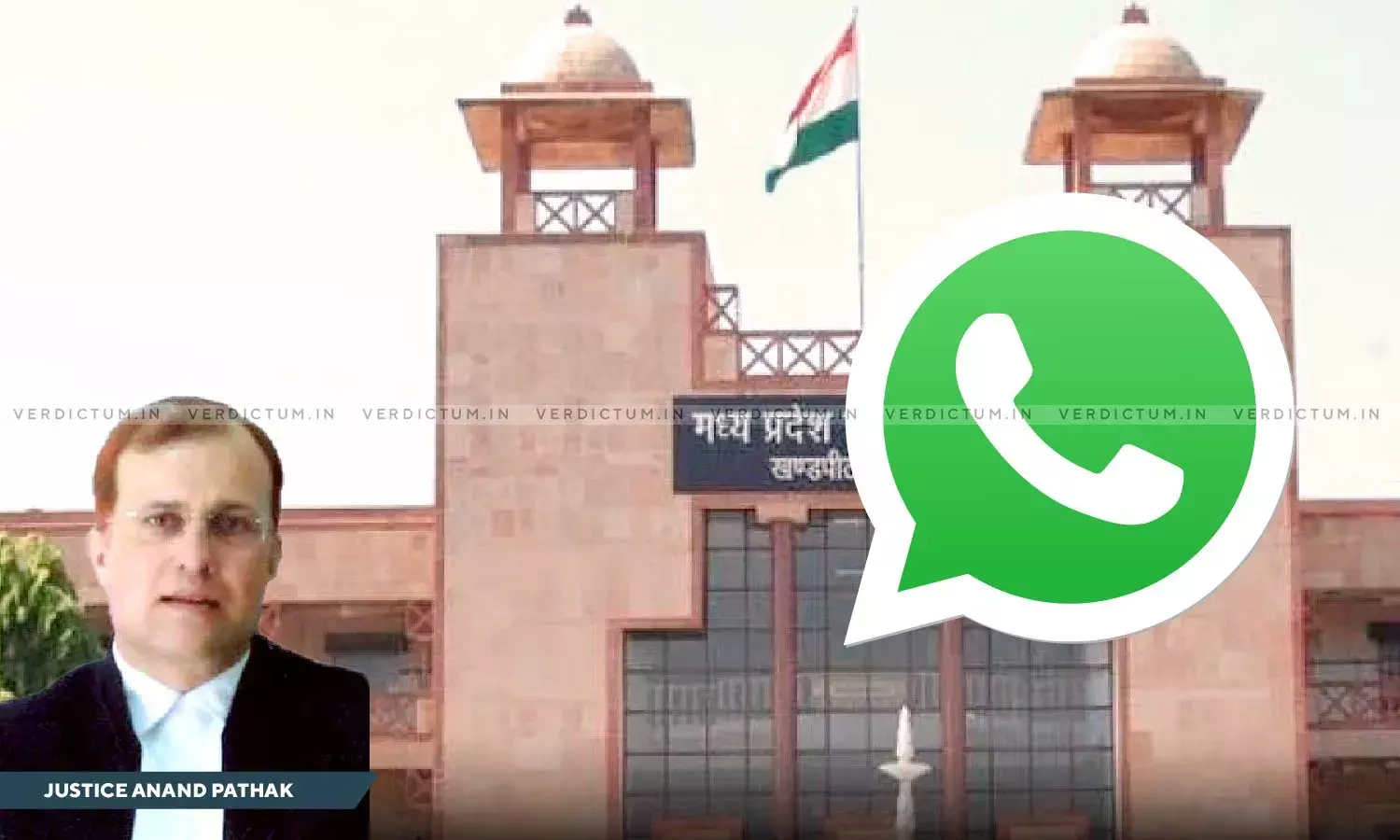Think Of Creating WhatsApp Groups For Twin Purpose Of Summoning Witnesses & Their Protection: Madhya Pradesh HC Tells Police

The Madhya Pradesh High Court, Gwalior Bench has told the Director General of Police (DGP) and Director of Prosecution to think of creating the concept of WhatsApp groups for twin purposes i.e., summoning witnesses and protecting them.
The Court was deciding two criminal cases and the instant petition under Section 482 of CrPC was preferred by the petitioner for issuance of direction to the Trial Court for expeditious conclusion of proceedings/criminal trial in relation to the case pending before the Special Judge (MPDVPK Act), District Morena.
A Single Bench of Justice Anand Pathak said, “… in the considered opinion of this Court, Investigation (Police), Prosecution (District Prosecution Officer) and Adjudication (Trial Court) shall rise to the occasion and shall ensure the presence of private/official witnesses without any delay and Senior Officers of the department shall cooperate in this regard. It is earnestly believed by this Court that Director General of Police and Director, Prosecution shall seriously take a workshop and suggestion from police officers and other experts to think of creating concept of WhatsApp Groups for twin purpose of summoning the witnesses and protection of witnesses.”
The Bench observed that the police authorities can ensure service of summons of other witnesses also in which District Prosecution Officer shall cooperate and shall undertake their Chief Examinations before the Trial Court without any delay.
Advocate Harshit Sharma appeared for the applicant while Deputy Advocate General Virendra Pal appeared for the respondents.
Brief Facts -
The petitioner was the informant/complainant/victim in the case, wherein at his behest, an FIR was lodged because of the murder of his son and a case was registered under Sections 147, 148, 149, 302, 394 of the Indian Penal Code and Sections 11, 13 of the M.P. Dakaiti Aur Vyapharan Prabhavit Kshetra Adhiniyam, 1981 (MPDVPK Act). Investigation was carried out by the police, wherein the accused persons were apprehended and arrested and after conclusion of investigation, charge-sheet was filed before the Special Court so established under the MPDVPK Act, whereby after taking of the cognizance for the offences, charges were framed for offences under Sections 396, 394, 302, 147, 148, 149, 120-B of IPC, Sections 25, 27 of the Arms Act, 1959 and Sections 11, 13 of the MPDVPK Act.
Out of five accused persons, three accused persons were juvenile and out of them one was ordered to be tried as an adult by the Juvenile Justice Board, whose order was affirmed by the Session Court and therefore, he was being tried before the court of V Additional Session Judge. As more than four years had elapsed and all the eye-witnesses were examined before the Trial Court and only official and formal witnesses were to be examined and through the proceedings filed by the petitioner with the petition as well as synopsis indicate that because of non-appearance of some witnesses, case was lingered on, therefore, the petition was preferred.
The High Court in the above context of the case noted, “This Court is of the considered opinion that time consumed in summoning the witnesses and when witnesses do not turn up cause sever dent to the case of prosecution and ultimately defeats the cause of justice. Due to delay, witnesses are threatened, won over, overpowered or allured so that they did not support the story of prosecution and become hostile. Even if they are not won over, even then they do not turn up for deposition. Some times big communication gap exists because those summons which are being issued by the learned Trial Court did not reach to the witnesses and for police, it is a less important job.”
The Court suggested for the purpose of the present case as well as for other cases to follow so that not only in the present case, witnesses may be served and officers must turn up for deposition before the Trial Court so that the trial may be concluded at the earliest., but these suggestions may go a long way for Police Authorities, Prosecutors and Complainants/Witnesses for seamless conduct of trial.
“Privacy and dignity/decency of the members of the WhatsApp Group be maintained, so that it may be available only as tool for facilitation of trial rather than for any other purpose. … These suggestions are only illustrative and not exhaustive”, also said the Court.
Furthermore, the Court observed that any good suggestion as contemplated by the police officers can also be incorporated, provided it helps in seamless conclusion of trial while maintaining the privacy and identity of the witnesses.
“In the present case, it appears that sufficient time has consumed by the stake holders in conducting the trial. It affects the confidence and morale of complainant in particular and cause of justice in general. … Not to forget that District Prosecution Officer plays an important role in conduct of trial and therefore, Director, Prosecution and District Prosecution Officer, Morena are duty bound to take interest in the case for ensuring the appearance of witnesses. Not only this, Superintendent of Police, Morena and Inspector General, Chambal Zone are also duty bound to intimate the official witnesses about their prompt attendance in the trial as witnesses, so that trial can be concluded at the earliest. Already, it exceeded the reasonable period of time”, held the Court.
The Court concluded that police authorities can ensure service of summons of other witnesses also in which District Prosecution Officer shall cooperate and shall undertake their Chief Examinations before the learned Trial Court without any delay.
Accordingly, the High Court allowed the petitions.
Cause Title- Vijendra Singh Sikarwar v. The State of Madhya Pradesh


